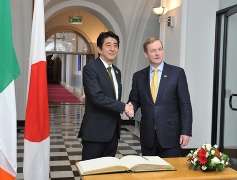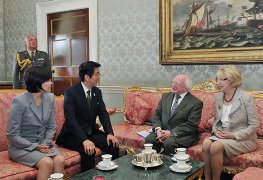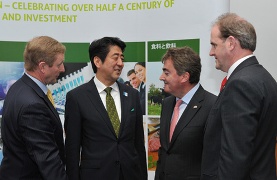Countries & Regions
Visit to Ireland by Prime Minister Abe (Overview and Evaluation)
 (Photo: Cabinet Public Relations Office)
(Photo: Cabinet Public Relations Office)
 (Photo: Cabinet Public Relations Office)
(Photo: Cabinet Public Relations Office)
 (Photo: Cabinet Public Relations Office)
(Photo: Cabinet Public Relations Office)
Prime Minister Shinzo Abe made an official visit to Ireland on Wednesday, June 19 as the first incumbent Japanese prime minister. The following is an overview of the visit.
1 Itinerary10:55 – 11:20 Courtesy call on Michael D. Higgins, President of Ireland, accompanied by their wives
11:55 – 12:40 Summit meeting with Enda Kenny, Prime Minister of Ireland
12:45 – 13:00 Joint press conference by the two prime ministers
13:00 – 13:10 Short meeting with Irish business leaders
13:15 – 14:15 Working lunch hosted by Prime Minister Kenny
(1) Courtesy Call on President Higgins and His Wife
Prime Minister Abe expressed his respects to Ireland for its persistent efforts, together with the United Kingdom, for peace in Northern Ireland over recent years and its fiscal and structural reform measures to cope with the European debt crisis. He then said that Japan would like to work with Ireland, which shares the same basic values as Japan and is working toward the same goal of economic revival.
In return, President Higgins explained his country's efforts toward peace in Northern Ireland and the current situation of improvement in the Irish economy, and expressed support to boost cooperative relations between Japan and Ireland, which share the same values. He also expressed a strong interest in Prime Minister Abe's economic policy measures, which he said represents a new paradigm.
The two leaders agreed to cooperate to further promote bilateral as well as Japan-European Union (EU) relations.
(2) Japan-Ireland Summit Meeting with Prime Minister Kenny
-
Bilateral and Japan-EU Relations
Prime Minister Kenny said the world economy needs the recovery of the Japanese economy and he placed much hope on Prime Minister Abe's economic policy measures. He expressed strong hopes for further Japanese investment in Ireland. Prime Minister Kenny also said Prime Minister Abe's economic measures have attracted great attention in Europe and have been very helpful as guidance.
Prime Minister Abe highly appreciated Ireland's all-out efforts to pull itself out of the European debt crisis and the way the country has steered the EU during this difficult time as the Chair of the EU.
Prime Minister Abe proposed the following three points for bilateral cooperation in line with the three key words of his growth strategy. Prime Minister Kenny expressed his strong support, saying the three key words form "a common DNA" between the two countries.
- Development of human resources for "challenges": further encouragement of exchanges of students and researchers, and inter-university, cultural and various other exchanges, based on the "Memorandum on Cooperation in the Fields of Education, Science, Technology, Culture and Sports" signed in May this year.
- Promotion of "open" trade and investment relations: cooperation for overseas expansion of Japanese and Irish businesses and an early conclusion of an Economic Partnership Agreement (EPA) between Japan and the EU.
- "Innovation" for strengthening competitiveness: cooperation for strengthening competitiveness, including vitalization of private economic exchange, in the field of medical equipment and pharmaceutical business, in which Ireland excels.
-
Regional Situation and International Issues
The two prime ministers agreed on the Asian situation as follows:
- It is important for Japan and Europe, which share common interests, to cooperate for the stability and prosperity of Asia.
- Japan and Ireland should continue sending a message to North Korea that they will never tolerate its possession of nuclear weapons. Two countries also cooperate to solve the abductions issue.
Regarding the African situation and counter-terrorism measures, Prime Minister Abe explained the results of the recent Fifth Tokyo International Conference on African Development (TICAD V) and Group of Eight (G8) summit meeting and the two prime ministers agreed to continue cooperation for the achievement of peace and stability in Africa.
The two leaders agreed to further promote cooperation between the two countries in the areas of U.N. Security Council reform and arms reduction and nuclear nonproliferation.
(1) Prime Minister Abe was very warmly welcomed by Ireland as the first incumbent Japanese prime minister to visit the country since its independence in 1922. Ireland, which remained neutral during World War II, is a Japanophile, and his visit helped spur further exchanges in all walks of life between the two countries.
(2) Ireland won its freedom and independence from the United Kingdom on its own through a difficult struggle and thus deeply understands the importance of these universal values. With such a background, Ireland was able to confirm with Japan their plan to strengthen policy dialogue and cooperation toward peace and prosperity in the international community on the basis of shared fundamental values.
(3) Ireland has expanded its economy with characteristic diligence in an integrated European market 100 times the size of its own and is now making every possible effort to pull itself out of the European debt crisis. The leaders of Japan and Ireland confirmed their determination to cooperate for economic revival of both Japan and Europe, and shared the same recognition of the importance of an early conclusion to EPA negotiations between Japan and the EU and the necessity of promoting trade and investment relations contributing to economic growth in the two countries.
(4) Among various international issues, the two leaders reaffirmed cooperation in the area of disarmament and nuclear nonproliferation, in which both Japan and Ireland are good examples.
(END)
* The foregoing is a provisional translation. The date indicated above denotes the date of the original in Japanese.


